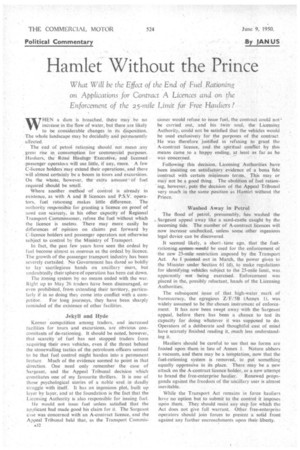Hamlet Without the Prince
Page 34

If you've noticed an error in this article please click here to report it so we can fix it.
What Will be the Effect of the End of Fuel Rationing on Applicaf ions'. for Contract A Licences and on the Enforcement of the 25-mile Limit for Free Hauliers ?
HEN a darn is breathed, there may be no increase in the flow of water, but there are likely to be considerable changes in its disposition. .The whole landscape may be decidedly and permanently affected.
The end of petrol rationing • should. not .mean any
• great rise in consumption for commercial purposes. Hauliers, the Rciaci Haulage 'ExecutiVe, and licensed ,passenger operatois• will use .little, if any, more. A few C-licence holders' may extend their operations, and there 'will almost certainly be a boom in tours and excursions. On the whole, 'however, 'the' 'extra amount" Of fuel required should be small.
'Where another method of control is already. in existence, as with A and B licences and P.S.V: operators, fuel rationing makes little difference. The authority responsible for granting a licence on proof of need can scarcely, in his other capacity of Regional 'Transport -Commissioner, refuse the fuel without which the licence is useless. There may more easily be differences of opinion on claims put forward by C-licence holders and passenger operators not otherwise subject to control by the Ministry of Transport.
. In fact, the past few years have seen the ordeal by file] become almost as onerous as the ordeal by. licence. The growth of the passenger transport industry has been severely curtailed. No Government has dared so boldly to lay' sacrilegious hands on ancillary Users, but undoubtedly their sphere of operation has been cut down. The zoning system by no means ended with, the war. Right up to May 26 traders have been discouraged, or even prohibited, from extending their territory, particularly if in so doing they come into conflict with a com petitor. For long journeys, they have been sharply reminded of the existence of other facilities.
Jekyll and Hyde
Keener competition among traders, and increased facilities for tours and excursions, are obvious con: cornitants of de-rationing. It should be noted, however, that scarcity of fuel has not stopped traders from acquiring their own vehicles, even if the threat behind the stonewalling tactics of the petroleum officers seemed to be that fuel control might harden into a permanent feature. Much of the evidence seemed to point in that direction. One need only remember the case of Sergeant. and the Appeal Tribunal decision which constitutes one of my favourite thrillers. It is one of those psychological stories of a noble soul in deadly struggle with itself. It has an ingenious plot, built up layer by layer, and at the foundation is the fact that the Licensing Authority is also responsible for issuing fuel. He would not issue fuel unless satisfied that the applicant had made good his claim for it. The Sergeant case was concerned with' an A-contract licence, and the . Appeal Tribunal held that, as the Transport Commis: A32
sioner would refuse to issue fuel, the contract could note be carried out, and' his twin soul, the Licensing Authority, could not 'he satisfied that the vehicles would be used exclusively for the purposes of the contract • He was therefore justified in refusing to grant the A-contract licence, and the spiritual conflict by this means came to a happy ending, at least as far as he was concerned.
Following this decision, Licensing Authorities have been insisting on satisfactory 'evidence of a bona' fide Contract with certain rinirlimum terms. This may or may not be a good thing. The abolition of fuel rationing, however, puts the decision of the Appeal Tribunal very much in the same position as Hamlet without the Prince.
Washed Away in Petrol
The flood of petrol, presumably, has washed the Sergeant appeal away like a sand-castle caught. by the incoming tide. The number of A-contract licences will now increase unchecked, unless some other ingenious legal device can be discovered.
It seemed likely, a short, time ago, that the fuelrationing system would be used for the enforcement of the new 25-mile restriction imposed by the Transport Act As 1 pointed out in March, the power given to the Minister under Section 61 (d), to 'make regulations for identifying vehicles subject to the 25-mile limit, was apparently not being exercised. Enforcement was placed in the, possibly reluctant, hands of the Licensing Authorities: The subsequent issue of that high-water mark of bureaucracy, the egregious Z/F/5B (Annex 1), was widely assumed to be the' choseninstrument of enforcement. It has now been swept away with the 'Sergeant appeal, before there has been a chance to test its capacity for doing whatever it was supposed to do. Operators of a deliberate and thoughtful cast of mind have scarcely finished reading it, much less understand ing it. .
Hauliers should be careful to see that no forms are 'foisted upon them in lieu of Annex 1. Nature abhors a vacuum, and there may be a temptation, now that the fuel-rationing system is removed, to put something equally oppressive in its place. There may be a new attack on the A-contract licence holder, or a new attempt
to brand the free-enterprise haulier. Renewed propaganda against the freedom of the ancillary user is almost inevitable.
While the Transport Act remains in force hauliers have no option but to submit to the control it imposes upon them. They should resist any step for which the Act does not give full warrant. Other free-enterprise operators should joinforces to present a solid front against any further encroachments upon their liberty. .
















































































